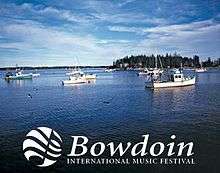Bowdoin International Music Festival
| Bowdoin International Music Festival | |
|---|---|
 | |
| Genre | Classical |
| Dates | June 25-August 6, 2011 |
| Location(s) | Brunswick, Maine, USA |
| Years active | 1964-Present |
| Founded by | Robert Beckwith, Lewis Kaplan |
| Website | |
| http://www.bowdoinfestival.org | |
The Bowdoin International Music Festival is an annual summer music school and concert series that takes place in Brunswick, Maine. Founded in 1964 by Robert Beckwith and Lewis Kaplan as a program of Bowdoin College, it has operated as an independent nonprofit organization since 1997.[1] 55 to 65 faculty and guest artists and up to 275 students perform in more than 80 concerts in the Brunswick area over a six-week period each summer. Faculty, guest artists, and students are all chosen through a highly selective process from among the world's top classical musicians.
Program
The mission of the Bowdoin International Music Festival is to provide gifted young musicians from around the world with an opportunity to study with world-class artists, and to provide audiences with classical music performed to the highest artistic standards.
The Bowdoin International Music Festival's concerts feature distinguished classical musicians from renowned chamber groups, orchestras, and conservatories worldwide, and the extraordinary young musicians who travel to Maine each summer to work with them in the Summer Study program.
The Summer Study program is designed for serious, advanced performers of classical music who are motivated, disciplined, and comfortable with a significant amount of independence.
Concert Series
During its six-week season, the Festival presents 20 concerts in four professional series and as many as 60 concerts in the Artists of Tomorrow, Community, and Bowdoin Festival Extra series.
Festival Fridays Festival Fridays is the Festival's premier Friday night series presenting traditional chamber music and orchestral repertoire performed by artists from around the world. Concerts feature Festival artists and guest artists such as Igor Begelman, Glenn Dicterow, Joan Kwuon, Joel Smirnoff, Sergiu Schwartz, Emma Tahmiazian, and the Ying and Shanghai Quartets.
Wednesday Upbeat! A mid-week series featuring an innovative mix of contemporary and traditional music in an informal atmosphere that attracts a younger, more diverse audience. The Upbeat! series includes many of the same performers as the Festival Fridays series. It also presents works by the Festival's resident and guest composers, such as Samuel Adler, Robert Beaser, William Bolcom, George Crumb, Richard Danielpour, Robert X. Rodriguez, Huang Ruo, Elliott Schwartz, and Bright Sheng.
Monday Showcases Monday Showcase is a series featuring resident and guest quartets performing both string quartet repertoire and collaborations between the quartets and Festival faculty.
The Charles E. Gamper Festival of Contemporary Music The Gamper Festival is a three-day program dedicated to broadening the understanding and appreciation of contemporary composers, both established and emerging. The Gamper Festival offers residencies to prominent American composers; provides opportunities for young composers to have their works performed on the same program as those of established artists; and introduces new music to students.
Bowdoin Festival Extra Concerts and public masterclasses feature resident artists and top participants; lectures feature faculty and guest presenters in venues located throughout Midcoast Maine.
Artists of Tomorrow Concerts in Studzinski Recital Hall on the Bowdoin College Campus featuring participants performing for an audience of their peers, instructors, and the public.
Community Concerts Concerts held at off-site venues, offering our participants additional performing opportunities before appreciative audiences.
History
In May 1964, Bowdoin College Music Department chair Robert K. Beckwith invited Lewis Kaplan to propose a summer concert series to take place at the College that summer. Kaplan was known at the time as the founder and leader of the Aeolian Chamber Players, a mixed-timbre chamber ensemble that performed both classical and contemporary music. Kaplan was also asked to design a summer music school for the following summer. Thus the Bowdoin College Summer Music Festival was born.
After a successful first summer of concerts, the Aeolian Chamber Players returned in 1965 with 19 students and a cadre of contemporary composers, including Elliott Carter, Meyer Kupferman, George Rochberg, and Morton Subotnick. Thus began the Festival’s contemporary music component, which came in time to be known as the Charles E. Gamper Festival, after its chief patron. In 1966, George Crumb made the first of many appearances for the world premiere of his Eleven Echoes of Autumn, 1965, solidifying a tradition of commissioning and offering residencies to notable composers that continues today.
Early students who have gone on to prominence, such as Emanuel Ax and Fred Sherry, helped to cement the Festival’s reputation as an attractive summer program for top students to hone their skills. With alumni in virtually every major orchestra and chamber group worldwide, that reputation is now secure.
The Bowdoin Festival grew rapidly as a program of the Bowdoin College Music Department through the 70’s, 80’s, and 90’s, changing its name along the way to the Bowdoin Summer Music Festival. In 1997, the Festival became an independent non-profit organization, and in 2004 changed its name to Bowdoin International Music Festival in recognition of its world-wide reach. Kaplan continued as the Festival’s director through its 2014 season, when the Festival celebrated its 50th summer as a teaching and presenting institution.
In September 2014, David and Phillip Ying, members of the famed Ying Quartet, became the Festival’s Artistic Co-Directors. Today the Bowdoin International Music Festival comprises seven concert series, an intensive summer study program, and service to Midcoast Maine and the field of music. The mission of the Festival is to provide gifted young musicians from around the world with an opportunity to study with world-class artists, and to provide audiences with classical music performed to the highest artistic standards.
References
- ↑ Nangle, Hilary M. - Article, Strad Magazine "Archived copy". Archived from the original on 2007-04-07. Retrieved 2008-12-23.,